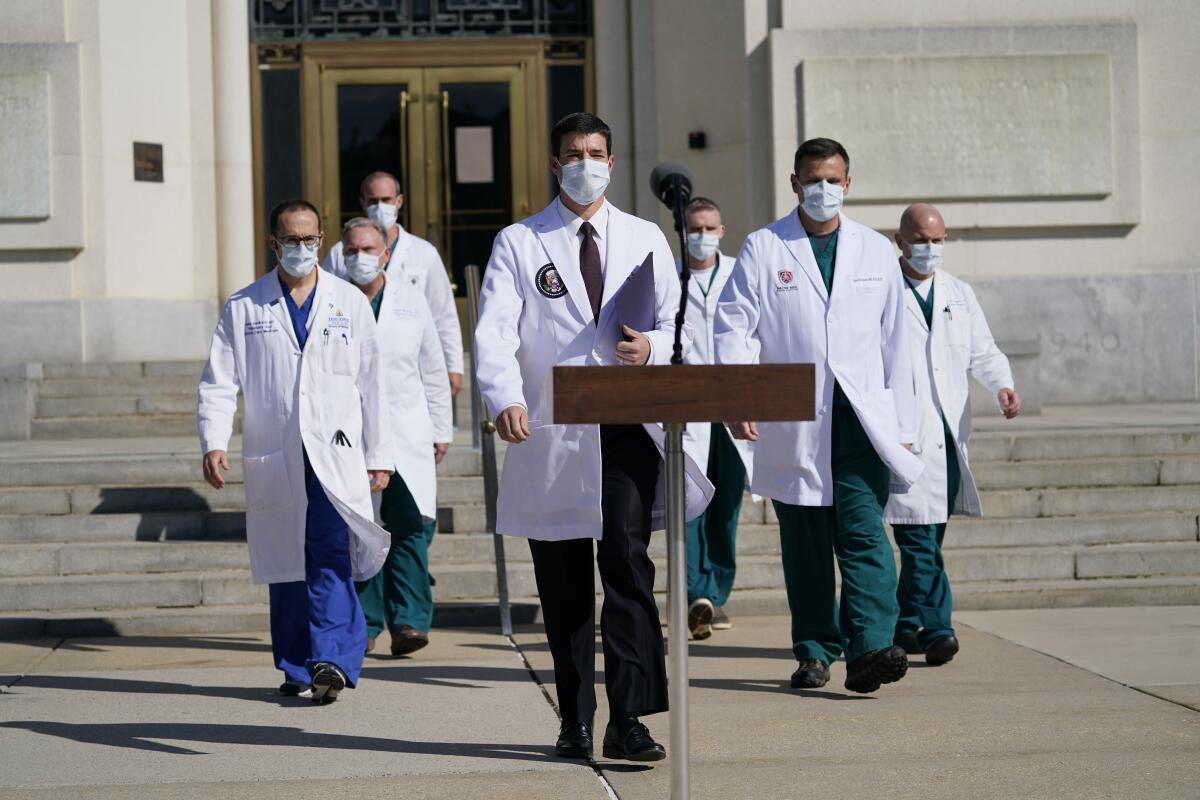Column: Is Trump getting the medical advice he wants rather than the advice he needs?

- Share via
A few years before he died, my friend Charles Krauthammer, a psychiatrist turned Pulitzer-winning political commentator, told me that the quality of healthcare you receive tends to rise in tandem with your income — up to a point. For some people, the two lines separate when they get so rich they can afford the diagnoses and treatments they want, rather than the ones they need.
Look at Steve Jobs and Michael Jackson, Charles said, very different people who shared a common addiction to getting their way. Jobs thought he could outsmart pancreatic cancer, rejecting conventional approaches until it was too late. Jackson could afford a doctor who would give him drugs no normal patient could get from a doctor. Jackson died from an overdose of propofol, a general anesthetic he used as a sleep aid.
This all came to mind over the weekend as the chaos that has followed Donald Trump around like the cloud of dirt accompanying Pig-Pen for his entire presidency moved to Walter Reed National Military Medical Center. Dr. Sean Conley, the White House physician, needlessly clouded the waters by getting the timeline of his diagnosis wrong. Then, when asked whether the president had been on supplemental oxygen, Conley dodged so transparently, everyone paying attention knew the answer had to be yes —Trump had needed oxygen — when Conley was trying to leave the impression the answer was no.
The next day, Conley admitted as much, saying his weird hedges were an attempt “to reflect the upbeat attitude” of the president and his team. He added that he “didn’t want to give any information that might steer the course of the illness in another direction.” Alyssa Farah, a White House communications advisor, confirmed to the New York Times that Conley was speaking for Trump’s personal benefit, not for the edification of the public. “When you’re treating a patient, you want to project confidence, you want to lift their spirits, and that was the intent,” she said.
If the president had read “The Masque of the Red Death,” he’d have Zoomed Amy Coney Barrett’s Rose Garden ceremony.
Between the two press conferences, White House Chief of Staff Mark Meadows confused things even more. Immediately after Conley’s first botched press conference, Meadows walked over to the pool reporters outside Walter Reed and corrected the record. “The president’s vitals over the last 24 hours were very concerning, and the next 48 hours will be critical in terms of his care,” he said.
Meadows wanted to be identified merely as someone familiar with his condition. Unfortunately, there were live cameras covering his approach to the press pool.
Trump was reportedly vexed by all this, and Meadows spent much of the weekend going back and forth with different media outlets trying to please the president by cleaning up the mess he made trying to clean up the mess Conley made, which Conley made in order to please the president.
It’s impossible to determine what the president’s actual condition is at this point, and not just because the collective messaging has been so incompetent and contradictory. If official reports are to be believed, the president is receiving treatments, most notably the steroid dexamethasone, normally reserved for very ill COVID-19 patients. In other words, he might be getting the healthcare he wants, rather than the treatment he needs.
It turns out the phenomenon Krauthammer described has a name, “VIP syndrome,” which involves, according to the Journal of Graduate Medical Education, “a cycle of patient demands resulting in unsound clinical judgment in efforts to meet unrealistic expectations resulting in deleterious outcomes.”
If you take a step back, one could argue that not only Trump’s response to the pandemic, “we’ve turned the corner,” etc., but his whole presidency, has been a case study in VIP syndrome. The superspreader event at the White House just over a week ago — which appears to have infected many attendees — was in direct defiance of public health guidelines promoted by the White House itself. There were the Trump campaign rallies, the first of which in Tulsa, Okla., may have led to the death of Herman Cain. And there was Trump’s Sunday night car ride. All of these have been exercises in VIP treatment.
Trump has always demanded a bespoke reality. He famously said in a deposition that his net worth was pegged not to his assets but his mood. As president, everyone from Cabinet officials and foreign leaders, to lowly staff, to the bulk of the conservative media, has either had to bend to the reality he wants or be pilloried as traitors, weaklings or liars. We should all hope for the president’s full recovery. But, a month before an election shaping up to be an electoral Gotterdammerung for these practitioners of iatrogenic politics, it’s worth noting that reality is getting some payback.
@JonahDispatch
More to Read
A cure for the common opinion
Get thought-provoking perspectives with our weekly newsletter.
You may occasionally receive promotional content from the Los Angeles Times.











